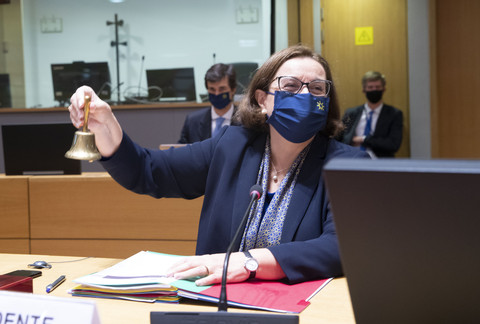[ad_1]

Portugal will push to start the ill-fated Conference on the Future of Europe at the beginning of its six-month presidency.
The conference, designed to include European citizens in shaping the future direction of the bloc, has been not only on hold because of the pandemic, but also due to intra-institutional infighting.
The one issue preventing the start of the conference, even in digital format due to Covid-19 restrictions, is who will be the chair.
Portugal’s prime minister António Costa will on Wednesday (20 January) hold discussions with European Parliament president David Sassoli and MEPs and try to resolve the issue.
However, member states are also yet to be on the same page on whether they would agree to a tripartite leadership to the conference.
“I would like to see this developing very quickly in the future, to have the citizens discussing short- and long-term policies that will address our current and future challenges,” Ana Paula Zacarias, Portugal’s state secretary for European affairs said on Monday (18 January) after an informal videoconference of EU affairs ministers.
“The three institutions are yet to agree on a statement on the way forward, we need to find the way forward, we need to find a pragmatic a quick way to solve the issue of governance,” Zacarias said.
She confirmed that some member states would like to see the conference starting as soon as possible, while others want to operate “cautiously”.
‘Tripartite’ fallback position
The parliament has put forward former Belgian PM and Renew Europe liberal MEP Guy Verhofstadt as their candidate for the top position – who is disliked by some member states who see him as too federalist.
The EU Council of member states has yet to put forward a name. EU diplomats last year said former Danish premier Helle Thorning-Schmidt had the highest chance of winning the backing of member states.
From the EU Commission’s side, commissioner for democracy and demography, Dubravka Šuica steers the process.
The idea of having a tripartite leadership for the conference was explored by the Germany presidency last year, but France – which is the main backer of the conference idea itself – has held out.
If an agreement is not reached on one single individual, since MEPs insist on the parliament’s role in any leadership, the tripartite option could become the fallback position.
“There has to be a clear balance between the three institutions,” Zacarias said.
MEPs say they are now waiting for member states to make up their minds.
“We have a clear position in the European parliament and we are waiting for clear position of council on that,” liberal group leader Dacian Ciolos told journalists on Monday.
“For the parliament, it is essential to be fully involved in this, especially in the chairmanship,” he added.
“A collective presidency could also be a solution, it is about dialogue with the people, not a one-man show of a personality ensuring the chairmanship of this conference,” Ciolos added.
“The co-presidency is an option,” Manfred Weber, group leader of the centre-right European People’s Party told reporters Tuesday, adding that “if it would unblock some of the problems, it is a possible solution for us”.
“Costa himself wants to have progress on this issue. If the co-presidency solution can work for the council side, the EPP is ok with it,” he added.
The Portuguese presidency hopes that once the chairmanship issue is resolved, the practical organisation of the conference can start using the commission’s “virtual and multilingual platform”.
The two-year conference, was initially scheduled to be launched on Europe Day (9 May) last year.
[ad_2]
Source link